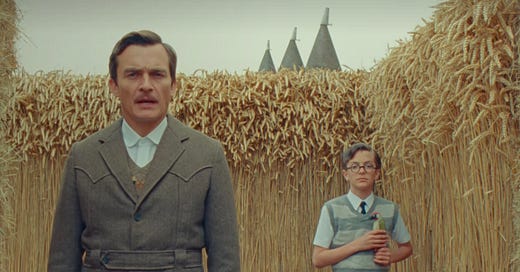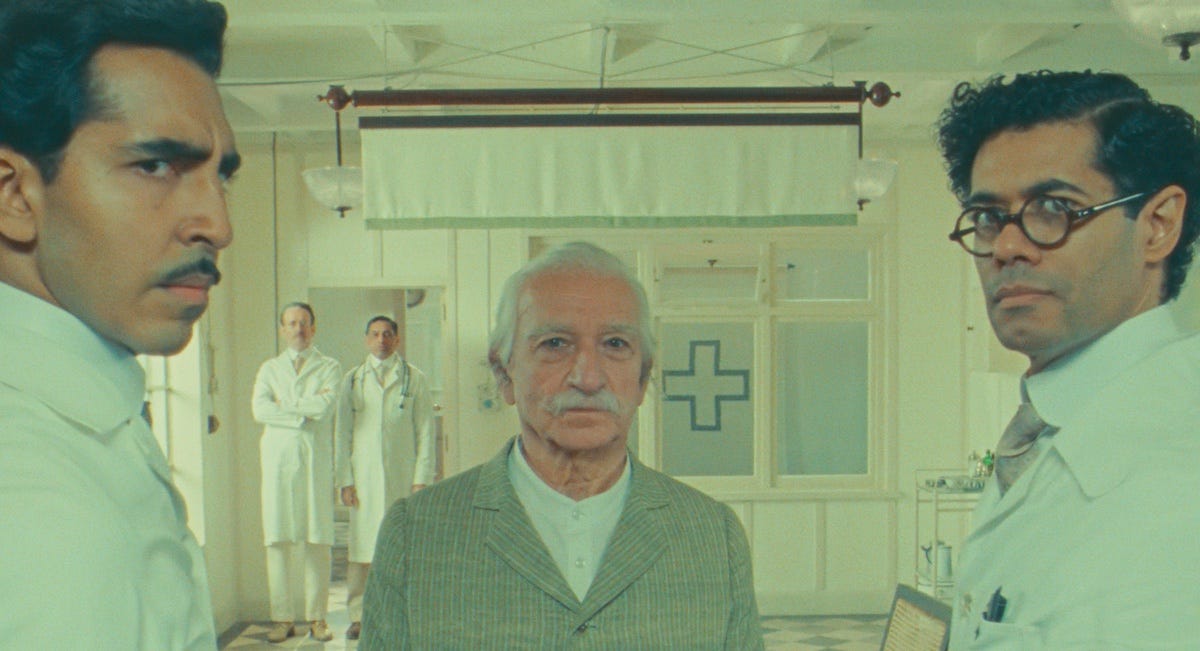To set the stage, allow me to say, first, that Wes Anderson is both one of the great filmmakers of this era and one of my personal favorites. I could pick a film of his from four different decades, and each of them would be in the running for my top ten of that decade.* Even if I didn’t love his latest—which I still saw twice in theaters, on nearly back-to-back nights—I very much look forward to everything he does.
Furthermore, Roald Dahl was a defining author of my childhood years: I tore through the longer stuff like The BFG and Charlie and the Chocolate Factory and The Witches; I read and re-read the short stories aimed at slightly older readers at probably too young an age. The most nervous I’ve ever been when interviewing a filmmaker was when I got 20 minutes on the phone with Wes Anderson to discuss his stop-motion adaptation of The Fantastic Mr. Fox. I hope I can be forgiven, as it rather perfectly represented the collision of my childhood and my 20s (and, frankly, my 30s) into one rather pleasing whole.
So it was with some excitement earlier this year that I learned Anderson had already shot and was readying the release of four short films based on Dahl’s work. The longest of the shorts, “The Wonderful Story of Henry Sugar,” debuted at Cannes this year alongside Asteroid City. In addition to “Henry Sugar,” we were also going to get takes on “The Rat Catcher,” “The Swan,” and “Poison.” What an embarrassment of riches! A Wes Anderson feature and an anthology of shorts, all in the same year.
And yet, I felt something very confusing when I turned on Netflix and happened to notice that there was not one, but four, new releases from Wes Anderson on the service.
Apathy.
Indeed, a couple of nights ago as I was trying to decide what to watch I opted not for the new Andersons but a decades-old John Carpenter picture. Judging by the chatter, or lack thereof, on social media, I’d guess that I’m not alone in this.
The thing about Netflix is that it creates a sort of anti-urgency: well, it’s there, and it’ll be there forever, I guess, so no reason to rush and see it. A Wes Anderson movie in a theater feels like an event, something to get excited for, something to go to. Hell, if this series of shorts had been packaged as an anthology and given a limited theatrical run, I probably would’ve seen it at my Drafthouse the first night it was out. Instead, it’s just kind of … there.
I don’t mean to pick on Netflix, as this is a broader problem with streaming, perhaps even a foundational, conceptual problem: convenience breeds complacency. But given Netflix’s size and spending power, the problem feels amplified when it comes to a Netflix original. A new Wes Anderson project should feel like an event and be treated as such. It shouldn’t just show up as a tile amongst many on the app my kids use to watch Miraculous.
Anyway. The new Anderson shorts are, artistically and formally, pretty interesting projects. In each of the shorts, the characters read not only their dialogue but also their action, giving the films the feel of a visual audiobook. For instance, in “The Wonderful Story of Henry Sugar”—the story of how a wealthy Brit (Benedict Cumberbatch) came to be able to read through the backs of playing cards, enabling him to cheat at blackjack—we hear, in flashback, Dr. Chatterjee (Dev Patel) discuss the strange case of Imdad Khan (Ben Kingsley), who can see perfectly despite having bandages over his eyes. Whenever Chatterjee says something, he says it and then turns to the camera and says “he said,” narrating also the action as when, for example, he and Dr. Marshall (Richard Ayoade) are running through the halls of the hospital chasing the blinded-but-seeing Khan.
Meanwhile, the staging is extremely stage-like, backgrounds wheeled in and out, Anderson’s camera rolling horizontally from one flat set to another. As in Asteroid City, Anderson is calling attention to the artifice of storytelling qua storytelling, but I think the effect here is more congruous, giving greater weight to the metaphorical import of each of the tales. It works to best effect in “Poison,” which features a bedridden man, Harry (Cumberbatch, again), convinced an incredibly poisonous snake has come to rest on his chest. In a panic, Harry sends Woods (Patel, again) to fetch Dr. Ganderbai (Kingsley, again), who brings an antivenin and endeavors to get the snake off of Harry’s chest without it biting him. But the true poison isn’t in the snake’s fangs; it’s in Harry’s words, his very soul, as we see when, in frustration, he uses a racial epithet against Ganderbai.
The relentlessness of the dialogue is what stands out, the constant chattering. It works to best effect in “The Swan,” in which Rupert Friend narrates the torment of a young birdwatching boy by two older bullies. He tells the story as you might read it to a child—the voice of the bullied boy, Peter, sounds tempered, even; the voice of the bullies sneering and high-pitched, a mixture of malice and smallness—all the while pacing forward and backward as he plays out the suffering of young Peter. “The Swan” is like many other Dahl stories in that it involves a smaller person made to suffer by a larger person, but the outcome is more surreal and less certainly triumphant than in, say, something like Matilda.
The nature of storytelling—and, perhaps more importantly, the stories we tell ourselves about ourselves—has long been one of Anderson’s main preoccupations, all the way back to Bottle Rocket and Dignan’s (Owen Wilson) discomfort with his station in life. This particular formal conceit—again, what we might call “visual audiobook”—feels like the logical endpoint of what Anderson began toying with in The Royal Tenenbaums and used to more extended effect in The Grand Budapest Hotel, the whole story-within-a-story-turned-into-a-film thing. One wonders where he will take it next.
Hope to see you in New Orleans! I’m going to be hosting a movie trivia contest at 6:30 in the bar/restaurant attached to the theater, is my tentative understanding, which is right before Tim’s talk with Walter Isaacson. There will be prizes! Get your tickets now!
Links!
This Friday’s Across the Movie Aisle about the decline of robot movies was a great deal of fun; I hope you check it out. And without spoiling too much, I think I manifested this Blu-ray into existence.
I enjoyed both reading and editing Bill Ryan’s essay on Richard Bachman, the cult King of 1980s horror.
I reviewed The Exorcist: Believer this week. Sadly, it is not particularly good.
Zandy Hartig’s essay on Oldboy and the nature of trigger warnings is pretty well done, I think; the issue when it comes to content advisories is less that they exist (the MPAA ratings and the content labels affixed to them are essentially the same thing) and more how dang condescending they can be. Don’t treat people like they’re too fragile to understand art!
A thing I think about more than I probably should: the conspicuous effort to airbrush the critically acclaimed and many-trophied Louie out of the history of prestige TV given Louis C.K.’s fall from grace. It basically just … doesn’t show up on lists like this anymore, despite making tons of year-end lists from critical groups, winning Emmys, etc. It’s just funny, is all.
This movie looks awesome:
So does this movie:
I do kind of wonder if we’ve hit the point where society—inundated with floods of videos of mobs ransacking stores and stories about white-collar criminals stealing billions—has decided to embrace a cycle of Dirty Harry/Death Wish-style vigilante pictures. If so, I am here for it, let me tell you. Love me a good vigilante movie.
Assigned Viewing: In the Mouth of Madness (Criterion Channel)
Criterion’s running a couple of pretty interesting series now, a horror one and a technothriller one. As mentioned above, I watched this because it’s one of the few John Carpenter movies I’ve yet to see (I think the list is now down to the Chevy Chase Invisible Man movie, which sounds like an all-around disaster) and it’s not always streaming. Fascinating picture, particularly given its release proximity to Wes Craven’s A New Nightmare and Scream. Meta-horror was all the rage in the mid-to-late 1990s, and I am terribly fond of much of it.
*Rushmore (1998), The Royal Tenenbaums (2000), The Grand Budapest Hotel (2014), and The French Dispatch (2021). Tenenbaums and Budapest are definites; the other two are definite maybes.








“In the Mouth of Madness” is awesome. Watched John Carpenter’s “Escape From New York” last night. Now I have identified the source of Fox News’ current vision of cities (except for the President’s Brit accent).
Sonny, what is your take on Bottle Rocket? I love the film, but it is definitely a "first film" and lumpier than Rushmore et al.